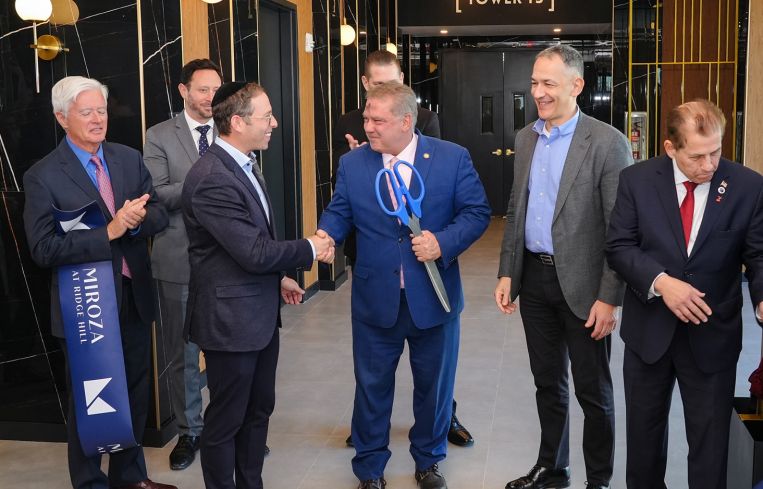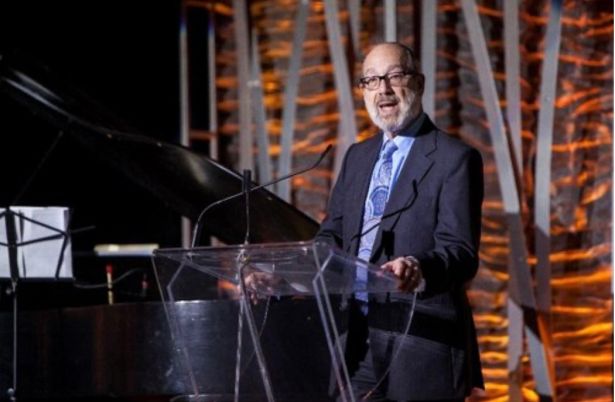An Israeli Development Firm Saw Something in Yonkers — and It Paid Off for Both
Azorim, known for building up the Tel Aviv region, has been ambitiously pursuing projects in the NYC neighbor with a friendly administration’s help
By Brian Pascus May 29, 2024 1:02 pm
reprints
A Dutch hamlet founded 15 miles north of Manhattan on the Hudson River nearly 400 years ago has become the apple in the eye of an ambitious overseas developer that has long dominated the skylines of Tel Aviv and Netanya.
If this sounds surprising, then you don’t know much about Azorim, a top Israeli development firm, or the Empire State’s perennially overlooked city of Yonkers — as the two seemingly incompatible partners have become a match made in real estate heaven.
Since entering the Yonkers market in 2013, Azorim has slowly but steadily built a stateside reputation, after spending the last 65 years as an eminent residential developer in Israel. While it might seem counterintuitive for a firm that helped turn Tel Aviv into an international enclave to actively choose Yonkers, rather than Manhattan, or even Queens, as its home base in the U.S. market, there’s a method here.
“We believe we found our niche and it works for us,” said Jack Klein, chief operating officer of Azorim and director of Azorim Israel. “We’re building something slowly, we’re in this for the long run, and we’ve identified an amazing city that’s very pro-development.”
At 211,569 residents, Yonkers is New York’s third-largest city, after the Big Apple and Buffalo. And, as Azorim has increased its American footprint these last 10 years, Yonkers has simultaneously inaugurated a new leap forward in its own right.
“The City of Yonkers has been an amazing partner with us,” added Klein. “They had never really heard of us, and the one thing we told them was, ‘We are totally committed to investing in this city, we’ve identified certain opportunities, all we ask is just work with us.’ ”
These opportunities Azorim pinpointed early on have flourished as two projects that have helped transform the Yonkers skyline and added luxurious yet affordable housing options to the greater community.
At Ridge Hill — a live-work-play town square near the Grassy Sprain Reservoir and Sprain Ridge Park in Yonkers — Azorim has developed Miroza, a four-building residential complex totaling 520 units. The firm built the first two towers between 2013 and 2023, and opened the third for leasing on April 1 this year.
A fourth tower is currently in predevelopment.
Miroza’s buildings are connected by a 25,000-square-foot amenity center with a swimming pool, a basketball court, a movie theater and a running track. That connection turns the apartments into a self-contained city, and steps from the well-regarded restaurants and medical center of the Ridge Hill neighborhood.
“This locale of Ridge Hill is unique, in that people aren’t interested in the hustle and bustle. They want the best bang for their buck,” explained Klein. “It’s a lifestyle change: All shops are across the street, and for those who work in New York City, we have shuttles for the 30-minute train into the city.”
“It’s a way of living where everything is at your fingertip,” he added.
Then there’s Hudson 44, a $145 million new multifamily development that will rise 27 stories above the Hudson River in Downtown Yonkers (the project recently reached the 14th floor after eight months of building).
Klein credited AvalonBay and Scott Rechler’s RXR for paving the path for Azorim to develop a new multifamily tower along previously barren waterfront landscape.
“We found a small parcel, 23,000 square feet near a ShopRite, the Hudson River and the downtown train station,” said Klein. “We bought it. Some people thought we overpaid. It was zoned for 15 stories and 150 units, but we went to the zoning board and got a variance for 27 stories and 250 units.”
The close collaboration with Yonkers’ city officials has been essential in Azorim securing choice development opportunities. Klein and his team have worked intimately to cultivate relationships with Mayor Mike Spano, who has presided over City Hall since 2012, as well as Jim Cavanaugh, former commissioner of Yonkers’ Department of Planning & Development.
“When we first got on board there were promises, and a lot of promise on our waterfront, but we didn’t have deep-pocketed developers,” Spano told Commercial Observer. “Jack Klein is someone who seems to be genuinely excited about the projects he’s involved in, and what more can I ask for? When you see the projects are moving forward smoothly, that’s all a mayor wants.”
Cavanaugh echoed these cozy sentiments.
“The thing about Azorim is that they do more than they need to,” he said. “They’re not a company that says, ‘What do we have to build and how can we do it in the most economical way?’ They really look at a site and say, ‘How can we make this something that has a wow factor, something that will have a signature look?’ ”
The Spano administration wooed Azorim by offering creative tax benefits. For example, at Hudson 44, Azorim will receive a sales tax exemption of $5,768,750, a mortgage recording tax exemption of $1,282,286, and a 20-year payment in lieu of taxes agreement valued at $12,389,928. In return, Azorim agreed to Spano’s demand of reserving 10 percent of all units in its building for below-market-rate, affordable housing.

Klein emphasized that Azorim chose Yonkers over other municipalities for its proximity to Midtown and the opportunity to construct large multifamily buildings that were cheaper to build in Yonkers than in New York City. His team felt their product would be quickly absorbed by providing superior amenity packages and different leasing options than other competitors that are also developing in Westchester. Most importantly, they liked that Yonkers was a one-seat, 35-minute train ride from Grand Central Terminal — making their apartments attractive for commuters.
“We’re working with the administration to create more jobs for the city, affordable housing and have units available to rent,” said Klein. “People want to move to Yonkers. Whether they are locals, or people from the Bronx or Manhattan or Brooklyn, we want to offer them something that is unique and beautiful.”
Foreign affairs
Azorim wasn’t always attracted to America. The firm began operations in 1965, just prior to the optimism generated by Israel’s victory in the 1967 Six-Day War. For decades afterward, the firm specialized in rental housing, mixed-use development and occasionally office skyscrapers.
Among the biggest projects the firm has developed in Israel are Exchange, two 55-story towers — one office, the other residential — in Ramat Gan in east Tel Aviv; Herzliya Hills, a 600-unit apartment complex in Herzliya; Eir HaYam Haifa, a five-building, 1,200-unit apartment complex in northern Israel; a three-building, 24-story luxury apartment tower trio in Netanya; and Azorim East, two luxury apartment buildings in East Netanya.
Twelve years ago, Canadian billionaire Hershey Friedman — who made his fortune in plastics packaging, gaining market share by packaging soda, Hershey’s chocolates, doughnuts and sliced bread — aimed to get into the real estate business. After three years of negotiations, in 2011 Friedman purchased a 67 percent stake in Azorim from Shaya Boymelgreen, the Israeli-American developer who had fallen on hard times in 2008 following the Global Financial Crisis.
Another issue influencing the sweetheart deal: Azorim had overextended itself by building in the unfamiliar real estate markets of India and Russia, according to Klein.
Today, Azorim is a publicly traded company on the Tel Aviv Stock Exchange with equity touching $3 billion and a market value at $5 billion. The firm is led by CEO Ron Avidan and has about 130 employees. Klein, who is Hershey Friedman’s son-in-law, handles the firm’s business in North America.
Under the direction of the Chairman and Majority shareholder, Friedman has assembled a team to manage and develop various development opportunities in Israel and in Yonkers.
“Our core business is in Israel. We helped build the state of Israel,” said Klein. “From north to south, east to west, Azorim is a brand name, it’s known by all the locals, and it’s known to build quality projects.”
Klein laughed as he recalled a story about his father-in-law, who once didn’t like the way the closets in an apartment building were being constructed, even though the project was nearly complete. The older man made his crew tear down three floors and reconstruct the apartments to his exact specifications.
“The engineers said, ‘Are you serious?’ He said, ‘Yeah, quality is No. 1, I don’t care if we lose money on this,’ ” recalled Klien. “We will never sacrifice on our quality. We’ll go into a project even if we have to overspend on our equity, we’ll do it until the bank financing kicks in.”
Azorim typically uses BHI Bank Hapoalim — an Israeli bank — to finance its American projects and has enlisted Bohemia Realty Group, a local firm whose expertise is in Harlem and the Bronx, to work as its broker of choice in Yonkers.
“It’s a match made in heaven,” said Klein. “I think the city benefits as much as we do. We’re really working in harmony. I wish every relationship was like this.”
A familiar story
Yonkers is one of the oldest municipalities in New York. Founded in 1640 by Adriaen van der Donck, who turned a land grant from the Dutch East India Company into a thriving saw mill at the junction of where Nepperham Creek meets the Hudson River, the city’s name comes from the founder’s status as a Dutch nobleman: “Jonkheer” (young nobleman) is how van der Donck was known to townspeople.
As the sawmills turned into taverns and the taverns evolved into main streets with small businesses, the city became a popular outpost for inventors. Elisha Otis invented the first commercially viable safety elevator in Yonkers in 1854, and Edwin H. Armstrong developed FM radio while living in Yonkers in 1912. The city gained a reputation as an industrial outpost, too. Its factories and mills constructed Otis elevators and carpets for much of the 20th century.
The city’s population reached 204,000 by 1970, but fell to 188,000 two decades later. It was a familiar story: As once dependable industries left, the remaining residents and their anxious leaders took it upon themselves to reimagine what Yonkers could be in the 21st century.
“As was the case of most northern cities, industry moved south or overseas, so we’ve had to repurpose, and we’ve been successful doing that,” said Cavanaugh. “The waterfront has been repurposed into residential because people want to live along the Hudson River.”
And those derelict industrial factories that once produced elevators and carpets have been turned into the headquarters for Kawasaki manufacturing — which manufactures subway and commuter rail cars for the New York City transit system — and the East Coast outpost for Lions Gate Studios. That’s right — they’re making movies and television shows in Yonkers, N.Y.
Using a carve-out in a film industry union agreement, Yonkers has found itself the beneficiary of a loophole that allows studios to pay the same rate to actors and writers to work in Yonkers as they would in New York City — which saves the studios thousands of dollars in production costs.
“The film industry is taking off. It began a decade ago but it’s become really big and continues to grow,” said Cavanaugh. “When all is said and done, we’ll have 22 soundstages across the city in Yonkers, which is quite possibly the biggest collection [of soundstages] in the Northeast.”
Moreover, low crime, good schools and new residents have helped increase the population by 8 percent over the last decade, as a growing number of New Yorkers have realized they can still access the Big City without all the hustle and bustle (some would say chaos and confusion) by living along the Hudson in a once-forgotten hamlet.
“I think for a long time we were a hidden secret, but we’re a real jewel,” said Mayor Spano.
“Yonkers is a city where if you’re in the downtown, you’re 20 minutes outside of Midtown Manhattan, 20 minutes outside of White Plains, and less than 40 minutes from every airport,” he continued. “It’s just in this center of 20 million people, and, for some, it just didn’t get the attention it should’ve gotten for years, but I like to think we’ve changed that.”
Bright future
As more people have moved to Yonkers since 2010, Azorim has seen its gamble on the formerly derelict industrial town pay off in spades.
The firm spent $55 million to build its second tower at Ridge Hill — refinancing it with TPG Insurance for $72 million — and spent $61 million to build the third tower. Today the Miroza apartments in Ridge Hill command rents 13 to 15 percent higher than the average market-rate rents in Westchester County, according to Klein.

The success of Azorim’s developments in Yonkers has given the firm room to expand into another local market: New Rochelle, a 40-minute drive across the Cross County Parkway.
The firm is under contract in New Rochelle on a piece of land zoned for 351 residential units. The time frame and plans on that project have yet to be determined, according to Klein, who added Azorim is more focused on Yonkers and seeing through the final four years of the development-friendly Spano administration.
Azorim’s Friedman has directly fostered a relationship with city officials and has aligned himself with the vision of Spano, with whom he shares a close relationship.
Under the Spano administration, the city government has authorized some 12,000 units of new housing, largely on old brownfields that were cleared away (together with old factories) and replaced by housing and mixed-use development facing the Hudson. Besides Azorim, Avalon Bay, Extell, Rose Construction, Medera and RXR have all entered Yonkers to either build new developments or repurpose old buildings since Spano took office 12 years ago.
The change is apparent to the mayor. Spano was raised in southwest Yonkers, and said he had no access to the Hudson River growing up in the 1970s and 1980s. To him, the fact that all this redevelopment in his city has prioritized river access for residents makes all the difference.
“It’s about giving access to the children who live in Yonkers to the Hudson River. That was one thing I learned — I never had access to the Hudson River, and at the end of the day, whatever access you did get was pretty sticky,” recalled Spano. “We knew that when we did these developments, every one had to have an amenity that allowed the public access to the Hudson.”
Aside from building several new parks in the city, the Spano administration recently purchased 3 acres on Ludlow Street, a main thoroughfare, for $15 million, and is planning to build another park along the Hudson River.
This support for commercial real estate — more specifically, the belief that development can improve the fortunes of a community — is not just what sets the Spano administration apart in Klein’s eyes, but is the central difference between the Israeli political system and the American one when it comes to real estate development.
“Israel is obviously very dear to us, we love and support Israel, but the difference between developing and the progress in Israel versus the States is almost day and night,” said Klein.
Members of the U.S. business community often criticize the red tape and regulations inherent in the development process. Yet, compared to Israel, it seems like America’s various approval processes are a platonic ideal of bureaucratic efficiency dreamed up by Franklin Roosevelt.
Because available land is so scarce in Israel — a nation roughly the size and population of New Jersey but largely dominated by desert -– all the biggest developers fight over the same parcels. The permitting and zoning process is infinitely more complex, too, with several levels of bureaucracy that often cause delays of a half-decade or longer just to finalize land purchases, explained Klein.
“My CEO was just in for the ribbon-cutting [in Yonkers] with the mayor and city officials — it’s almost painful for them to see it: You come in, you have an action plan, a game plan, and you execute it. The city is totally on board,” said Klein. “It’s really a partnership over here. I’m not saying Israel is not a partnership, but you’ve got a lot of red tape that you have to go through.”

Yonkers remains committed to cutting red tape and approving all sorts of development.
With an eye toward addressing the nation’s housing crisis, the city’s planning board recently gave site approval for almost 2,000 new units of housing, of which 37 percent have been classified as affordable (80 percent or less of area median income). Cavanaugh’s economic development team views the downtown area and the waterfront area as prime locations for new building and redevelopment opportunities.
“We’ll continue to push market-rate and affordable [housing], and we’ll continue to pay close attention to commercial corridors like Central Avenue, shopping centers, but you can’t take it for granted,” he said. “We want Yonkers to continue growing. It’s been a success story for the last 10 years, so let’s keep that moving forward.”
One wild card in the deck that could potentially augment the fortunes of Yonkers, and by extension Azorim: one of three available state casino licenses that could be awarded to MGM Empire City Casino. MGM Empire is currently a racetrack/slot-machine hybrid “racino” limited by state regulations from adding table games and on-site gambling to its offerings. For decades MGM Empire City Casino has been an economic driver for the city despite a lack of table games such as poker, blackjack and roulette, or a sportsbook for betting.
Cavanaugh said that MGM has already told the city it is willing to put $1 billion into the current facility in the event Yonkers is awarded one of the three downstate casino licenses, an investment he believes will create hundreds of jobs and “an untold amount” of tax revenue for the state.
“It’s enormously frustrating to the City of Yonkers that the State of New York has dithered with regard to these three licenses,” said Cavanaugh, who noted the licensing oversight process is now two years old. “It’s a great facility, it’s making a lot of money for the State of New York and the City of Yonkers, but it could rise to a whole other level if only the state would award a casino license.
“No one can figure out how Albany is missing the boat on this,” he added.
As for Klein and Azorim, an honest-to-god casino in Yonkers would merely be a lucrative bonus to an already fruitful partnership. Ten years ago, when Azorim sought out a submarket, the firm surely didn’t expect their partner of choice to turn into an entertainment district, and a bustling city committed to its own betterment through reinvention.
“We were looking for a submarket, not Manhattan, which already has lots of successful business people, so we felt that wasn’t a place that needed fresh Israeli money,” said Klein. “We looked and we searched and we found Yonkers, N.Y., a place 35 minutes away from the city on the Metro-North, and it’s been an amazing ride ever since and we look to grow there.”
Brian Pascus can be reached at bpascus@commercialobserver.com



